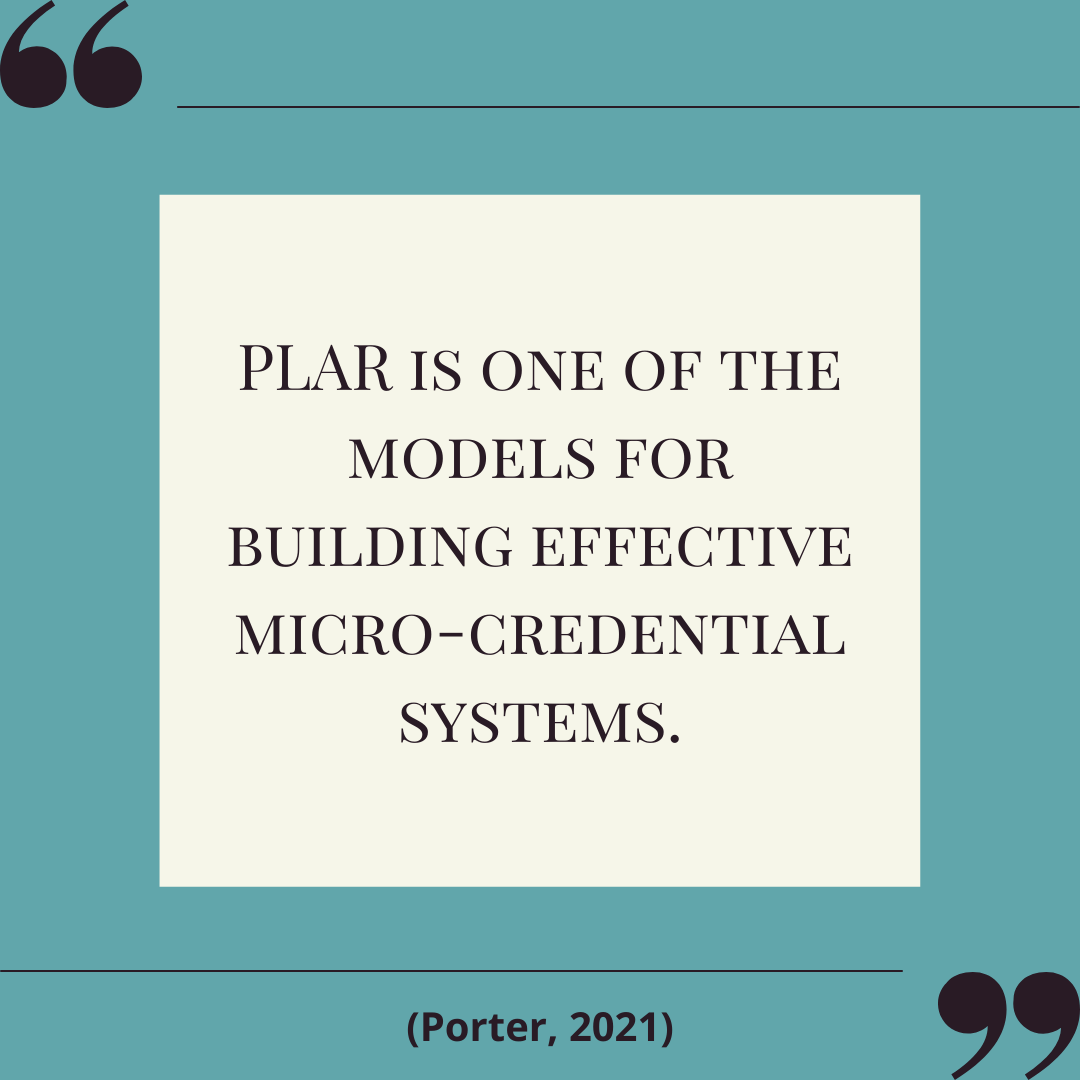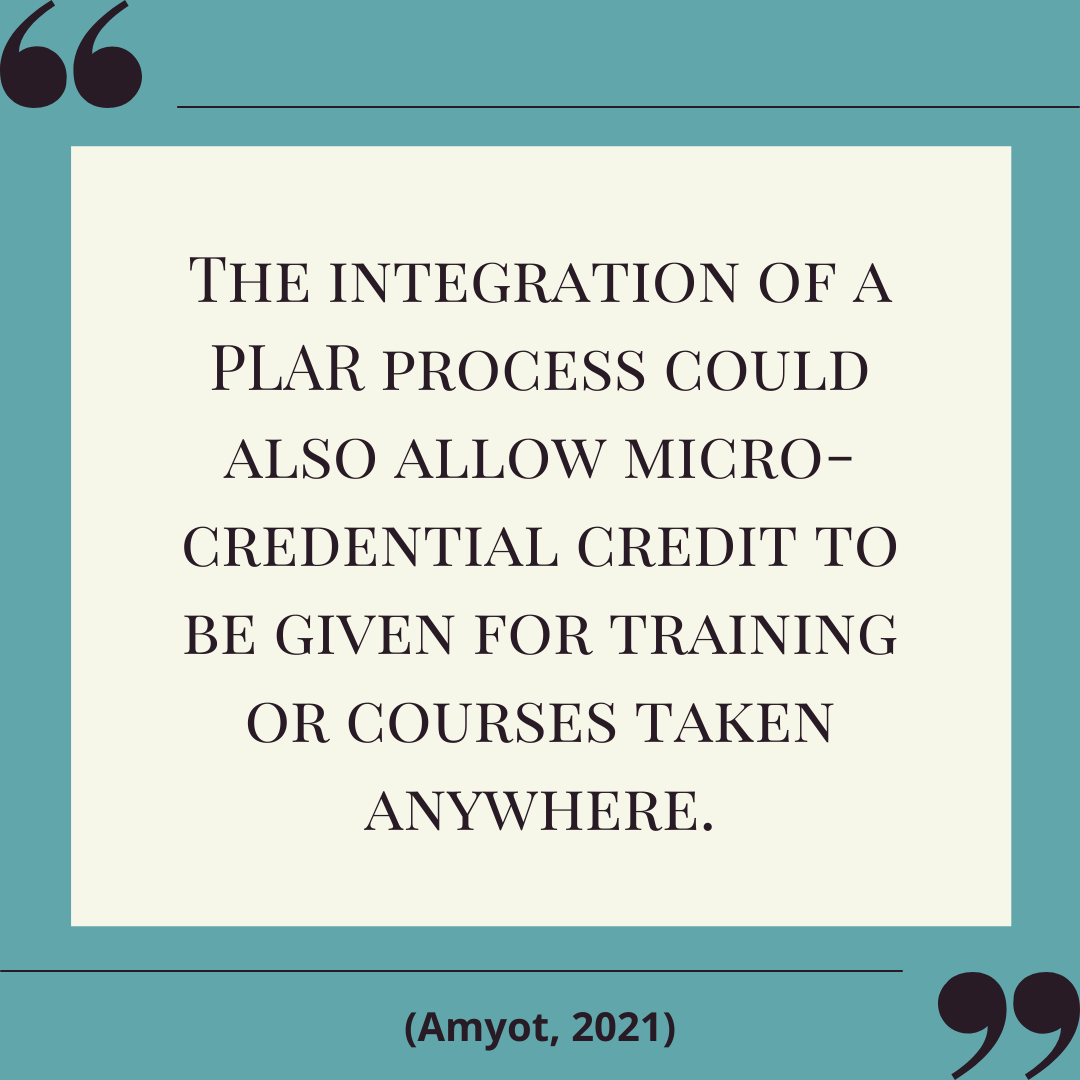Micro-credentials and PLAR: The Dynamic Duo of upskilling and credential advancement
by Lori Woods, Faculty-Disability and Community Studies Department - Douglas College & Andrew Skapenko, Operations Manager, BCPLAN
As British Columbia endeavours to shift out of the COVID pandemic and the resulting economic disturbance, people are looking for a booster pack to speed recovery. One of the answers is the exponential merge of Micro-Credential and Prior Learning Assessment and Recognition. Micro-credentials are currently making a successful, reconstituted debut in post-secondary and employment environments while in many industries and institutions PLAR languors on the sidelines. Intrepid organizations are recognizing the power of combining this new micro-credential option with an updated prior learning assessment and recognition model that significantly boosts timely results for both individuals and society.
Component 1: PLAR
The amount of knowledge an average person gains throughout their life outside of a formal post-secondary environment is massive.
With the help of Prior Learning Assessment and Recognition (PLAR), this “informal” learning gained in a non-formal setting can be validated by purposeful assessment and recognition. In her article “Prior Learning: Unlocking A Little-Known Career Superpower”, Susan Forseille, PLAR Director, Thompson Rivers University, defines PLAR as “… as processes that allow individuals to identify, document, have assessed and gain recognition for their learning done outside of a formal classroom.” (Forseille, 2020)
Stemming from the recent research project - PLAR Options, Processes, and Credit Allowances in BC - BC Prior Learning Action Network completed for BC Council on Admissions & Transfers compiled a list of educational institutions across the province where one could have his/her informal learning assessed and recognized.
The benefits of PLAR include credential completion, cost-savings and enhanced career opportunities within considerably shorter time frames. From an employer perspective, PLAR makes the organizational succession planning process smoother, requiring less time and financial resources to help both existing and potential employees fill labour gaps. In times of economic turmoil, PLAR can help job seekers upskill and reskill to advance or change their careers. Of note PLAR can bring up as much as $31 million dollars to BC’s economy. (BCPLAN, 2021)
Component 2: Micro-credentials
“Micro-credentials are formal, short duration learning experiences that are competency based and can be assessed and recognized for employment or learning purposes.” (BCcampus, 2021)
"PLAR is one of the models for building effective micro-credential systems, through recognizing the existing skills of individuals, validating those skills against workplace competencies, and/or supporting individuals to close skill gaps, upskill or reskill to match available credentials that will enhance workforce opportunities." (Porter, 2021)
They are a complement to traditional post secondary credentials, such as degrees. Examples of micro-credentials can include Digital Transformation at British Columbia Institute of Technology, Writing for Business Success at Thompson Rivers University and Leading Projects in a Digital Environment: Micro-Credential Program at Kwantlen Polytechnic University.
A compelling aspect of micro-credentials is their stackability: vertical (combination of several micro-credentials), horizontal (completion of several credentials in the related field) and complementary (combination of diverse credentials such as micro- and post-graduate credentials in addition to industry-specific certificates). (Duklas, 2020)
The Power Combo: PLAR and Micro-Credentials
The alchemy of these two concepts comes from their shared emphasis – timely, respectful and rigorous recognition of learning.
It would be a lost opportunity if post secondary institutions and industry training merely considered micro-credential learning as new learning. Simply breaking existing post secondary learning into smaller chunks would also minimize the potential. Industry and post secondary need to be alert to emerging and hidden learning-chunks and optimize them by building in prior learning assessment for those employees and potential employees who have already gained the desired knowledge and skill base.
The history of PLAR in BC is somewhat spotted. Some institutions excelled while some floundered. Many lessons were learnt that could be optimized during this time of an ideal resurgence. The wise and intrepid institutions and industry leaders who spearhead the movement will set the precedent for those who follow.
"The other advantage colleges and institutes can offer when developing micro-credentials is the use of prior-learning assessment and recognition (PLAR), which is already common practice at nearly all institutions. This process can reduce costs and the time commitment for adults who might otherwise find participation in training difficult. This allows prospective learners to begin with an assessment of competencies already attained through education or work experience, which can allow them to skip certain courses or modules. The integration of a PLAR process could also allow micro-credential credit to be given for training or courses taken anywhere, including outside of Canada, supporting transferability." (Amyot, 2021)
While the two concepts have strengths of their own, it is the synthesis of both that brings the true value in significantly opening access to post-secondary education to a wider audience, supporting learning recognition and developing economies in a timely, cost effective and respectful way.
References
- Amyot, D. (2021, April 21). Defining micro-credentials and forging a new path for lifelong learning. CareerWise. https://careerwise.ceric.ca/2021/04/21/defining-micro-credentials-and-forging-a-new-path-for-lifelong-learning/#.YP9uPo5KhPZ.
- BCcampus. (2021, May). Micro-credentials Overview. https://bccampus.ca/wp-content/uploads/2021/05/Micro-Credential-Overview.pdf; BCcampus.
- BCPLAN. (2021, February). BCPLAN Infographic. https://bcplan.ca/resources/Documents/BCPLAN%20Infographic%20V.%202.pdf; BC Prior Learning Action Network.
- Duklas, J. (2020, November). Micro-Credentials, Trends in Credit Transfer and Credentialing. https://www.bccat.ca/pubs/Reports/MicroCredentials2020.pdf; BC Council on Admissions & Transfer (BCCAT).
- Forseille, S. (2020, October 6). Prior learning: Unlocking a little-known career superpower. CERIC. https://ceric.ca/2020/10/prior-learning-unlocking-a-little-known-career-superpower/.
- Porter, D. (2021, June 04). Presentation to BCPLAN community as part of the webinar: Micro-credential models that meet the needs of learners: standalone, stackable, and PLAR-enabled, BCPLAN Symposium, virtual. https://bcplan.ca/presentations.
